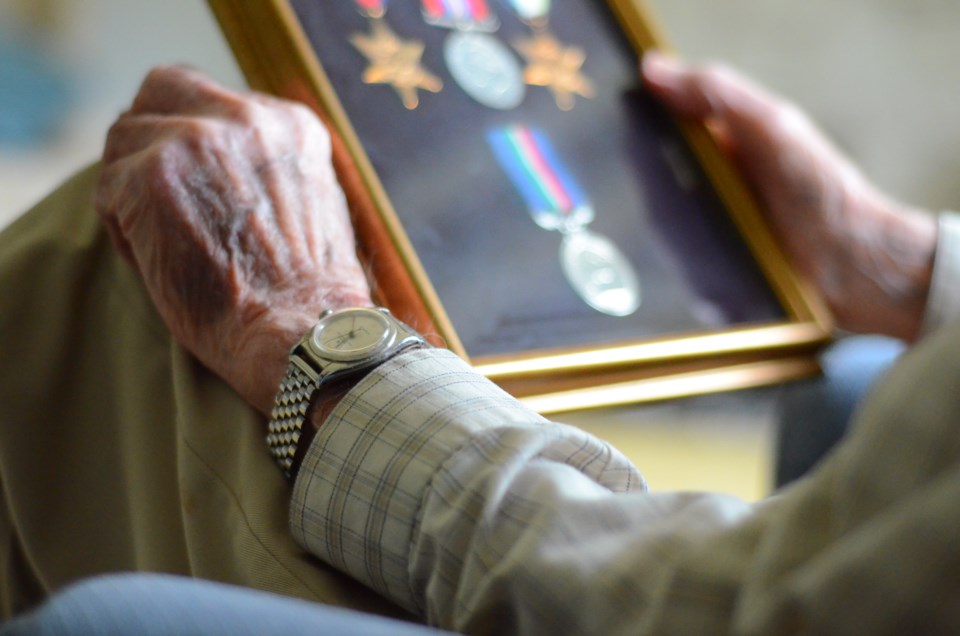A man’s wartime memento has stood the test of time.
Harold, who asked that his surname be withheld, served as an engineer for the British Merchant Navy in the Second World War. While he was in a reserved occupation and didn’t have to serve in the war, the 20-year-old chose to join the Merchant Navy in 1941.
“I wanted to go and see the world,” he explains. “I took off and was on the Celtic Star, one of the Blue Star Line ships.”
Harold, 94, crisscrossed the North Atlantic during the war, often sailing through atrocious weather.
“It was bad. Just rough. Rough waters and howling wind,” he says. “I used to get seasick. I wasn’t a good sailor. Sometimes I would feel like jumping over the side I was so darn sick.”
Harold and the rest of his crew travelled the world, stopping at ports in Africa, North America, Russia and South America, transporting food in a refrigerated ship, and sometimes people who were moving from England to Canada. While making a stop in Buenos Aires to pick up beef, Harold purchased a Rolex watch.
“It was a cheap watch,” he says of the watch that cost about 20 pounds at the time. “It’s been quite a good watch. South America was a good place for watches.”
On March 29, 1943, Harold’s ship was hit by a torpedo when it was about four miles off the coast of Sierra Leone.
“I was in bed. The torpedo hit about 40 feet from where I was asleep. All of a sudden my bunk collapsed. I tried to stand up and my legs were shaking. I thought to myself, ‘I have to get to the lifeboat station’,” Harold says. “It was such a violent explosion. I had a nice cabin with a bed and a table – everything collapsed.”
At the lifeboat station, the second mate told sailors to “jump into the sea” and climb into the lifeboats. Harold found himself on a life raft with about 25 men.
“We were torpedoed right off the African coast, just about on the equator,” he says. “It was rather strange. Right on the equator in winter, it gets dark about 4:30. I was the only one with a watch. They would keep saying, ‘What time is it?’ I would say, ‘It’s 4:45.’ They’d say, ‘No, your watch has stopped.’ I said, no it hasn’t. This went on and on. In the end I threatened to take the watch off and throw it in the ocean. They kept waking me up to ask the time.”
In a letter Harold wrote to his parents after being rescued, he said there were planes over head each day, but they didn’t see the lifeboat. One finally did but crashed into the ocean.
One day, the sailors saw a ship coming toward them and began waving at what turned out to be an Italian ship, which was “on the other side.”
“The crew were decent. I went on the ship. They wanted to know where we were going, what we were carrying. I told them everything. They said, ‘What would you like?’ We said we’d like water. He said ‘I’m sorry, but I’ve got lots of wine.’ He gave us all these bottles of wine,” Harold says. “Some of the crew were drinking too much damned wine.”
While at sea near the equator, the sailors faced scorching heat, water rations, stormy seas and sharks.
“They just hovered around the boat,” Harold says. “You couldn’t be washing your hands in the water in case a shark came out.”
After three-and-a-half days in the lifeboat, the men were rescued and transported to Freetown, the capital city of Serra Leone, where they’d remain for more than two months with thousands of other sailors who’d been rescued from ships hit by torpedoes.
“We were all waiting to get home,” Harold says.
Harold has received several medals for his contributions, including the Atlantic Star, which is given out for those who spent considerable time on the North Atlantic in the war.
Harold was at sea when the Second World War ended in 1945. He continued to serve with the Merchant Navy until 1951, when he returned to England, married his sweetheart Sylvia, whom he’d met in 1947 in their hometown of Sheffield and moved to Canada.
The watch that Harold wore through wartime and through tumultuous times on a life raft in the Atlantic remains on his wrist decades later. Not long ago, he took it to Cartwright Jewellers in New West for repairs, including the need to have custom-made gaskets because of its age.
“I’ve had it all these years. I’ve had it occasionally cleaned,” he says. “It has kept working all these years.”



